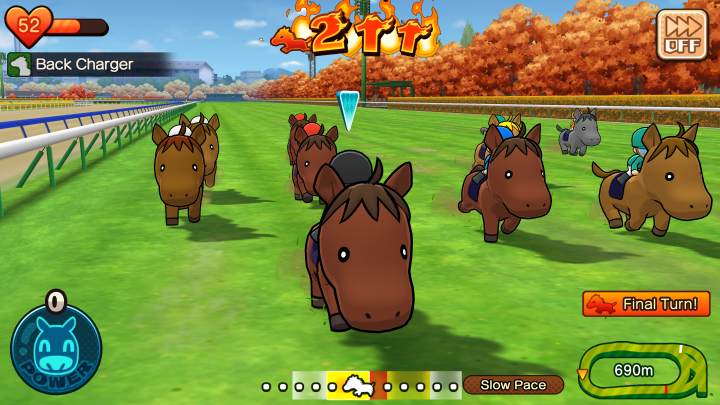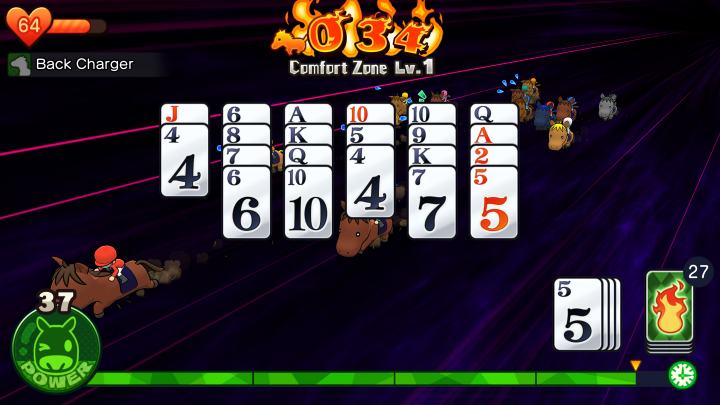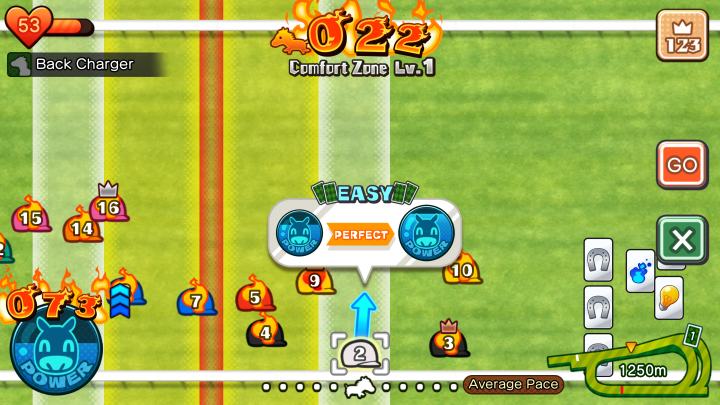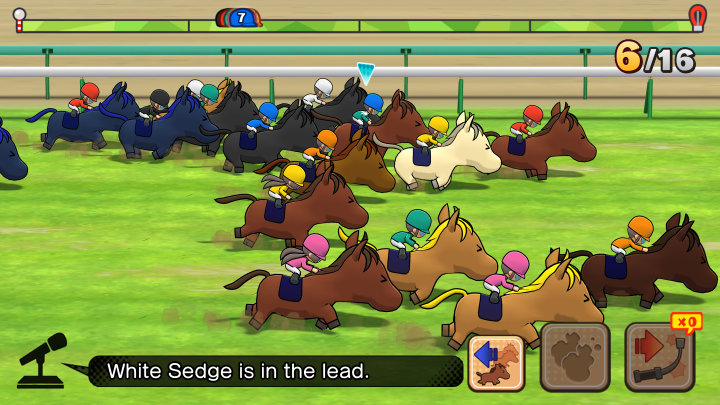You can learn a lot about a person by asking them “What’s the best Nintendo 3DS game of all time?” Someone who largely interacts with mainstream games might confidently respond with The Legend of Zelda: A Link Between Worlds or Fire Emblem: Awakening. Find someone a little more tuned into the wider landscape and you’ll hear titles like Zero Escape: Virtue’s Last Reward or Bravely Default step into the conversation. But a truly eccentric player might give you a more wildcard answer: Pocket Card Jockey.
Released in 2013, Pocket Card Jockey is one of Nintendo’s most bizarre games. In its opening setup, a jockey has a near-death experience after getting kicked by a horse. On their way to the afterlife, they meet some form of God who grants them a second chance at life, so long as they promise to become a champion rider. To help them in that quest, God gives them the power to race horses by playing rounds of solitaire. That premise would be weird enough on its own, but what’s even stranger is that it was developed by Pokémon studio Game Freak.
Ten years after its original launch, the 3DS oddity has been granted new life on Apple Arcade. Pocket Card Jockey: Ride On! gracefully translates the original into a tactile iOS game. The port is so seamless that it feels like it should have happened much sooner — and it briefly did depending on what part of the world you lived in. Ahead of today’s launch, Director Masao Taya spoke to Digital Trends about Pocket Card Jockey’s decade-long journey to a worldwide mobile launch. To make it happen, Game Freak just needed an extra push from a niche, but dedicated fanbase.
On your mark
For those who only know Game Freak for Pokémon, Pocket Card Jockey might seem like a left-field project. It’s the kind of oddball release you might expect out of a small indie studio rather than a giant developer responsible for one of gaming’s most profitable franchises. Taya provides some insight into how Game Freak is structured, allowing for the team to squeeze in smaller projects between Pokémon.
“At Game Freak we have an internal program called Gear Project,” Taya tells Digital Trends. “In this program, if enough people agree to an idea put forward by a staff member, those people will form a team to start development of a prototype. In principle, there are no limits on participation. The prototype will be developed over several months, then reviewed internally. If it’s interesting we’ll aim to release it as a product, increase the number of people working on it, and begin full-scale development.”

It’s that structure that allowed the studio to put out Pocket Card Jockey the same year Pokémon X and Y launched on Nintendo 3DS in Japan, and three years later in the United States. Directed by Taya, the $7 game instantly became a cult hit thanks to a wacky premise backed up by an addictive gameplay loop. In the 3DS version, one screen would show horses racing while the bottom touch screen would task players with completing a variation on solitaire (golf, more specifically) where they’d have to clear stacks of cards by tapping on them in numerical sequence. Successful rounds would grant their horse more enthusiasm and stamina, which would in turn help them run faster.
That’s all before getting into its horse breeding system, allowing players to carry on a steed’s legacy after it is put out to pasture at age four.
The inventive premise gave Game Freak a micro-hit that earned the studio a dedicated, niche fanbase. Though the project may sound like an easy side-project for the team to cut its teeth on between ambitious Pokémon titles, Taya notes that games like Pocket Card Jockey are actually much more complicated to assemble.
“Developing the game meant trying to juggle limited resources in terms of budget and workers, and also time,” Taya says. “Really, it’s like a game itself. Small-scale development is like choosing hard mode. I joined Game Freak because I like gaming and I’m generally the type who’ll actively choose hard mode, so I really enjoyed this job. There were quite a few days where I didn’t get enough sleep, but the feeling is like getting caught up in a game.”
Get set
While Pocket Card Jockey found success after its initial launch, Game Freak was slow to capitalize. The title was never ported over to Nintendo Switch, largely leaving it locked to the Nintendo 3DS eShop. The franchise’s journey was slightly different for players in Japan, though. The game received a short-lived Android and iOS port in 2014, but it was shut down one year later. At the time, fans worldwide were vocal about seeing the mobile version branch out to new territories. However, Taya explains that its original mobile ambitions were abandoned as the studio simply couldn’t figure out how to implement a working free-to-play structure.
“Seeing how well-received Pocket Card Jockey was after being released for Nintendo 3DS, our initial idea was to make it playable on mobile devices,” Taya says. “We released it as free to play (F2P) in Japan only, but that didn’t go well in business terms. I think the reason why was that to run it as an F2P title and make a profit from it we needed to adapt the style of a F2P game, but even as the director of Game Freak I didn’t have the knowhow for that.”

That challenge would place a hurdle in the franchise’s path, pushing it to the back of the herd as the studio moved on to its myriad of larger projects. Game Freak would be careful not to commit to a remake or any new version during that time, though sustained enthusiasm from fans would keep the team fully behind the idea of a new version when the time felt right; the trick would just be meeting those high fan expectations accordingly.
According to Taya, the right opportunity would arise when Apple Arcade began to gain attention in Japan. Due to the mobile game service’s unique structure, Game Freak was able to find a compromise that better suited its design expertise. “With Apple Arcade, which requires absolutely no in-app purchase beyond the subscription service fees, there was no need to forcefully remodel the game into an F2P style, so we figured that we’d do our best to make the fans happy,” Taya says.

While the announcement may not have been headline news at every major publication, it was a triumphant moment for fans who’d been waiting a decade to play Pocket Card Jockey on their phone. Though the team knew there was a lot of passion around the game, even Taya was surprised by just how much the decision would mean to fans.
“When it was made public that the game would be added to the Apple Arcade lineup, there was quite a big reaction in Japan, with Pocket Card Jockey trending on Twitter,” Taya says. “I was really surprised when the number of new unread items on my Twitter app showed up as 999. It impressed on me the number of players who’d been waiting for this.”
Ride on
For fans of the original, Ride On! is about as good of a mobile adaptation as one can hope for. The core game stands up a decade later, feeling just as satisfying with tap controls. There are a few noticeable changes here and there, like the addition of a daily login bonus that grants items and a dialogue tweak that has the main character name-dropping the iPhone as their solitaire platform of choice, but the same basic structure remains.

The main challenge would come from compressing two screens of information into one, something Game Freak would struggle to crack in its initial stab at a mobile port.
“In the race scenes in the 3DS version, you can see the horses running at the top screen,” Taya says. “That screen is to show the progress of the race. The lower screen is more important for information, making it easy for the user to see the types of special cards distributed on the course and the positions. We found it tough to concentrate all the information given on the two screens in the 3DS version into a single screen when creating the F2P mobile edition.”
The 2014 mobile release would try to solve that with a toggle button that would switch between the top and bottom screen views, which wasn’t exactly the most elegant view. The new version solves that by updating its race graphics to full 3D, rather than relying on a 2D view of the race track. It’s a smooth solution that doesn’t sacrifice any of the key information present in the original. The 3D animations make horse races feel more tense and dynamic too, giving a clearer picture of how a race unfolds (Taya says the visuals bring a “high level of realism,” which is a funny thought when looking at its cartoony steeds with massive heads).
It is sad, because there were lots of other interesting games as well as Pocket Card Jockey in the 3DS eShop.
While it might seem like an odd time to port Pocket Card Jockey to mobile, Ride On! comes at a particularly critical moment. The Nintendo 3DS eShop is set to officially shut down on March 27 this year, which spells disaster for small games like Pocket Card Jockey that never received a physical release. Once Nintendo closes up shop, it’ll be lost to time. Taya notes that the timely release of Ride On! is entirely a coincidence, but a fortunate one that turns it into an accidental preservation effort.
“It can’t be helped, but it is sad because there were lots of other interesting games as well as Pocket Card Jockey in the 3DS eShop,” Taya says. “But I’m very happy about the fact that we can release an Apple Arcade version at this time to continue to provide the game to original fans of it and to people newly interested in it.”
For those long-time fans, Pocket Card Jockey: Ride On! is a small victory. It’s proof that a dedicated community can have a positive impact on gaming, keeping even the weirder corners of its history alive. That’s an especially impressive feat given that the studio behind it has largely had its head down in Pokémon for the bulk of its career. Though there’s a newfound momentum for the franchise, Game Freak isn’t getting ahead of itself quite yet. It’s taking a slow and steady approach to the series’ return for now, focusing on Ride On! before breaking out into a full gallop.
“We’ll look at that reaction and the feedback we get to make further improvements as we can, to try and provide greater appeal,” Taya says. “We’ll think about what to do next based on that experience.”
Pocket Card Jockey: Ride On! is now available on iOS devices via Apple Arcade.



